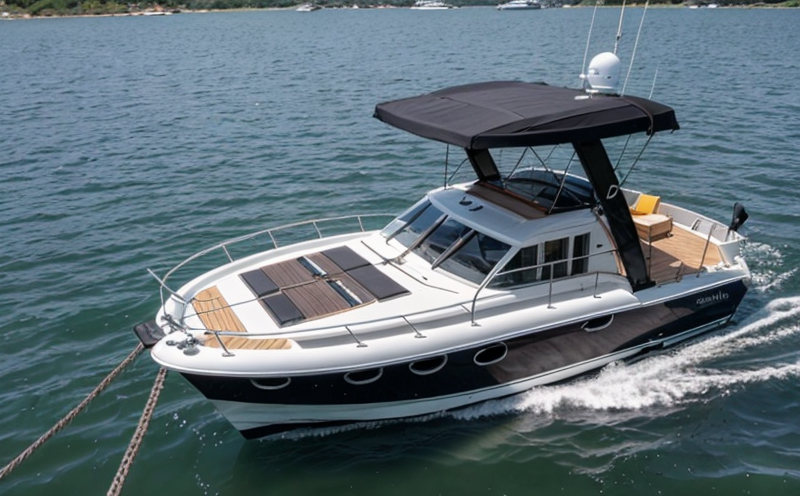ASTM D4268 Testing of Synthetic Ropes for Ships
The ASTM D4268 test method is a critical standard used to evaluate the tensile strength and elongation properties of synthetic ropes, which are essential components in marine operations. These ropes are subject to high-stress conditions during mooring, anchoring, and deck equipment functions on ships. The performance of these materials directly impacts maritime safety and efficiency.
The test involves subjecting the synthetic rope specimens to a series of mechanical loading cycles that simulate real-world stress conditions they might encounter in service. This procedure helps ensure that the ropes can withstand the forces exerted during their intended use without failure. The ASTM D4268 standard is widely recognized by maritime industry professionals, ensuring consistency and reliability across various applications.
The synthetic materials commonly used for these ropes include nylon, polyester, polypropylene, and aramids such as Kevlar. Each material has unique properties that make it suitable for specific marine environments and operational demands. For instance, aramids offer superior strength-to-weight ratios but are more susceptible to UV degradation compared to other fibers.
The ASTM D4268 test focuses on two primary aspects: tensile strength (breaking load) and elongation at break. Tensile strength indicates the maximum stress a material can withstand before it breaks, while elongation measures how much the rope stretches before failure occurs. Both metrics are crucial for assessing the durability of synthetic ropes in maritime settings.
Specimen preparation is critical to ensuring accurate test results. The synthetic ropes must be cut into specimens that meet specified dimensions and tolerances as outlined in the ASTM D4268 standard. Proper sample conditioning, including temperature stabilization and moisture control, further enhances the reliability of the test outcomes.
The testing process itself involves subjecting these samples to a series of mechanical loading cycles using specialized equipment designed for this purpose. The tests are conducted at controlled temperatures and humidities to simulate various environmental conditions encountered in maritime operations. This ensures that the synthetic ropes are evaluated under realistic conditions, providing insights into their performance characteristics.
The results from ASTM D4268 testing provide valuable information on the mechanical properties of the synthetic ropes, which can be used for quality control and improvement purposes within shipyards and manufacturing facilities. The data generated through this test helps manufacturers optimize material selection and processing techniques to enhance product reliability and safety.
Moreover, compliance with ASTM D4268 ensures that maritime operations adhere to international standards, enhancing overall maritime safety and efficiency. By adhering to these stringent testing protocols, ship operators can trust the integrity of their mooring and anchoring systems, thereby minimizing risks associated with equipment failure.
Scope and Methodology
| Aspect | Description |
|---|---|
| Tensile Strength Testing | This involves applying incremental loads to the synthetic rope specimen until it breaks. The maximum load at which failure occurs is recorded as the tensile strength. |
| Elongation at Break Measurement | The degree of stretching before breaking is measured using specialized equipment designed for this purpose. |
| Specimen Preparation | Standardized procedures are followed to ensure uniformity in sample dimensions and conditions, enhancing the accuracy of test results. |
| Environmental Conditions | The tests are conducted under controlled temperature and humidity levels to simulate actual maritime environments. |
| Data Analysis | The collected data is analyzed to determine compliance with ASTM D4268 standards, providing insights into the mechanical properties of the synthetic ropes. |
Customer Impact and Satisfaction
The implementation of ASTM D4268 testing ensures that ship equipment manufacturers produce high-quality products that meet stringent international standards. This not only enhances the reliability and safety of maritime operations but also improves customer satisfaction by delivering dependable mooring and anchoring systems.
By adhering to these rigorous testing protocols, customers can rest assured knowing their ships are equipped with reliable synthetic ropes capable of withstanding harsh environmental conditions. The consistent quality provided by compliant manufacturers leads to long-term savings in maintenance costs and reduces the risk of equipment failures that could disrupt operations or compromise safety.
Moreover, the transparency offered by ASTM D4268 testing allows customers to make informed decisions about their procurement choices, ensuring they select products from reputable suppliers who prioritize quality assurance. This trust between suppliers and buyers fosters a positive business relationship, ultimately contributing to customer satisfaction and loyalty within the maritime industry.
The results of ASTM D4268 tests are often used as part of larger compliance programs that ensure all components meet regulatory requirements for maritime operations. This comprehensive approach not only improves operational efficiency but also promotes safer working environments aboard ships.
Environmental and Sustainability Contributions
The use of synthetic ropes in marine applications has significant environmental benefits compared to traditional natural fibers like hemp or sisal. Synthetic materials are more durable, reducing the frequency of replacements required during a ship’s lifespan, which translates into lower waste generation.
Additionally, ASTM D4268 testing helps identify potential improvements in material composition and processing techniques that can further enhance sustainability efforts. For example, advancements in polymer chemistry could lead to ropes with improved recyclability or biodegradability properties, contributing positively to environmental conservation initiatives.
The stringent testing procedures mandated by ASTM standards also encourage continuous improvement in manufacturing processes, leading to reduced energy consumption and lower carbon footprints throughout the supply chain. As a result, the use of synthetic ropes supported by rigorous testing contributes significantly towards achieving global sustainability goals within the maritime sector.





